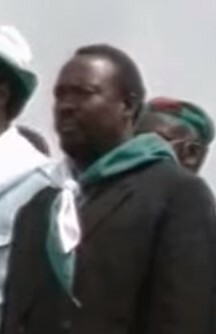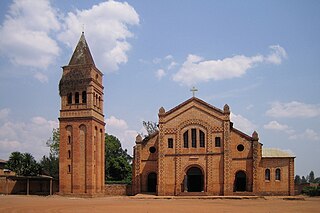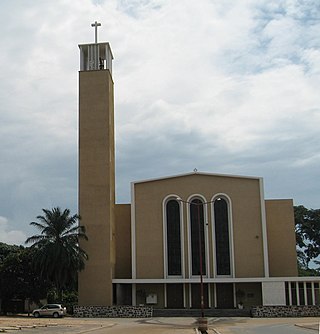Related Research Articles
Human occupation of Rwanda is thought to have begun shortly after the last ice age. By the 11th century, the inhabitants had organized into a number of kingdoms. In the 19th century, Mwami (king) Rwabugiri of the Kingdom of Rwanda conducted a decades-long process of military conquest and administrative consolidation that resulted in the kingdom coming to control most of what is now Rwanda. The colonial powers, Germany and Belgium, allied with the Rwandan court.
The Hutu, also known as the Abahutu, are a Bantu ethnic group which is native to the African Great Lakes region. They mainly live in Rwanda, Burundi, and Uganda where they form one of the principal ethnic groups alongside the Tutsi and the Great Lakes Twa.
The Tutsi, also called Watusi, Watutsi or Abatutsi, are an ethnic group of the African Great Lakes region. They are a Bantu-speaking ethnic group and the second largest of three main ethnic groups in Rwanda and Burundi.

The International Criminal Tribunal for Rwanda was an international court established in November 1994 by the United Nations Security Council in Resolution 955 in order to adjudicate people charged for the Rwandan genocide and other serious violations of international law in Rwanda, or by Rwandan citizens in nearby states, between 1 January and 31 December 1994. The court eventually convicted 61 individuals and acquitted 14.

Cyprien Ntaryamira was a Burundian politician who served as President of Burundi from 5 February 1994 until his death two months later. A Hutu born in Burundi, Ntaryamira studied there before fleeing to Rwanda to avoid ethnic violence and complete his education. Active in a Burundian student movement, he cofounded the socialist Burundi Workers' Party and earned an agricultural degree. In 1983, he returned to Burundi and worked agricultural jobs, though he was briefly detained as a political prisoner. In 1986 he cofounded the Front for Democracy in Burundi (FRODEBU), and in 1993 FRODEBU won Burundi's general elections. He subsequently became the Minister of Agriculture and Animal Husbandry on 10 July, but in October Tutsi soldiers killed the president and other top officials in an attempted coup.

The Rwandan genocide, also known as the genocide against the Tutsi, occurred between 7 April and 19 July 1994 during the Rwandan Civil War. During this period of around 100 days, members of the Tutsi minority ethnic group, as well as some moderate Hutu and Twa, were killed by armed Hutu militias. Although the Constitution of Rwanda states that more than 1 million people perished in the genocide, the demographic evidence suggests that the real number killed was likely lower. The most widely accepted scholarly estimates are around 500,000 to 662,000 Tutsi deaths.

The Burundian Civil War was a civil war in Burundi lasting from 1993 to 2005. The civil war was the result of longstanding ethnic divisions between the Hutu and the Tutsi ethnic groups. The conflict began following the first multi-party elections in the country since its independence from Belgium in 1962, and is seen as formally ending with the swearing-in of President Pierre Nkurunziza in August 2005. Children were widely used by both sides in the war. The estimated death toll stands at 300,000.

This is a bibliography for primary sources, books and articles on the personal and general accounts, and the accountabilities, of the 1994 Rwandan genocide.

The Great Lakes refugee crisis is the common name for the situation beginning with the exodus in April 1994 of over two million Rwandans to neighboring countries of the Great Lakes region of Africa in the aftermath of the Rwandan genocide. Many of the refugees were Hutu fleeing the predominantly Tutsi Rwandan Patriotic Front (RPF), which had gained control of the country at the end of the genocide. However, the humanitarian relief effort was vastly compromised by the presence among the refugees of many of the Interahamwe and government officials who carried out the genocide, who used the refugee camps as bases to launch attacks against the new government led by Paul Kagame. The camps in Zaire became particularly politicized and militarized. The knowledge that humanitarian aid was being diverted to further the aims of the genocidaires led many humanitarian organizations to withdraw their assistance. The conflict escalated until the start of the First Congo War in 1996, when RPF-supported rebels invaded Zaire and sought to repatriate the refugees.

Mass killings of Tutsis were conducted by the majority-Hutu populace in Burundi from 21 October to December 1993, under an eruption of ethnic animosity and riots following the assassination of Burundian President Melchior Ndadaye in an attempted coup d'état. The massacres took place in all provinces apart from Makamba and Bururi, and were primarily undertaken by Hutu peasants. At many points throughout, Tutsis took vengeance and initiated massacres in response.

Christianity is the largest religion in Rwanda, with Protestantism and Catholicism being its main denominations. Around 3% of the population claims no religious affiliation, while another 3% practices other religions including traditional faiths. Approximately 2% of the populace is Muslim.

Alison Des Forges was an American historian and human rights activist who specialized in the African Great Lakes region, particularly the 1994 Rwandan genocide. At the time of her death, she was a senior advisor for the African continent at Human Rights Watch. She died in a plane crash on 12 February 2009.

Burundi, officially the Republic of Burundi, is a landlocked country in the Great Rift Valley at the junction between the African Great Lakes region and Southeast Africa. It is bordered by Rwanda to the north, Tanzania to the east and southeast, and the Democratic Republic of the Congo to the west; Lake Tanganyika lies along its southwestern border. The capital city is Gitega and the largest city is Bujumbura.
Gersony Report is the name given to the 1994 findings made by a team under Robert Gersony, which was under contract to the United Nations High Commissioner for Refugees and identified a pattern of massacres by the Rwandan Patriotic Front rebels during and after their military victory in the civil war in post-genocide Rwanda. The findings were suppressed by the United Nations and involved governments for political reasons, and its existence was denied. No final written report was ever completed, though purported early written documentation has been leaked. The validity of Gersony's purported findings continue to be disputed.

Religion in Burundi is diverse, with Christianity being the dominant faith. Catholicism is the largest Christian denomination in the country.
Rwandan genocide denial is the pseudohistorical assertion that the Rwandan genocide did not occur, specifically rejection of the scholarly consensus that Rwandan Tutsis were the victims of genocide between 7 April and 19 July 1994. The perpetrators, a small minority of other Hutu, and a fringe of Western writers dispute that reality.
Laurien Ntezimana is a Rwandan Catholic theologian, sociologist and peace activist known for protecting Tutsi during the Rwandan genocide of 1994.

The Ikiza, or the Ubwicanyi (Killings), was a series of mass killings—often characterised as a genocide—which were committed in Burundi in 1972 by the Tutsi-dominated army and government, primarily against educated and elite Hutus who lived in the country. Conservative estimates place the death toll of the event between 100,000 and 150,000 killed, while some estimates of the death toll go as high as 300,000.

In Praise of Blood: The Crimes of the Rwandan Patriotic Front is a 2018 non-fiction book by Canadian journalist Judi Rever and published by Random House of Canada; it has also been translated into Dutch and French. The book describes alleged war crimes by the Rwandan Patriotic Front (RPF), Rwanda's ruling political party, during its ascent to power in the 1990s.

Relations between Burundi and Rwanda have existed for at least as long as the states themselves. Before contact with Europeans, Rwanda and Burundi were kingdoms competing to gain control over nearby territory. In the 1880s, the two kingdoms were placed under colonial authority, first by Germany, and then by Belgium after 1919.
References
- ↑ "Timothy P. Longman | Political Science". www.bu.edu.
- ↑ Alison Des Forges, Leave None to Tell the Story: Genocide in Rwanda , New York: Human Rights Watch, 1999.
- ↑ "Curriculum Vita, Timothy Paul Longman" (PDF). 2017.
- ↑ Susan Seligson (January 3, 2013). "CAS Prof a Valued Witness in Rwanda Trials". BU Today.
- ↑ John S. Freidman (May 2, 2011). "Genocide Trial in Kansas". The Nation .
- ↑ "The Lemkin Book Award". Institute for the Study of Genocide.
- ↑ Timothy Longman, "Zaire: Forced to Flee: Violences against the Tutsis in Zaire," Vol. 8, no. 2 (A), New York: Human Rights Watch, July 1996
- ↑ Binaifer Nowrojee and Janet Fleischmann (September 1996). "Shattered Lives: Sexual Violence during the Rwandan Genocide and its Aftermath" (PDF). HRW. New York.
- ↑ Shayna Rogers, "Sexual Violence or Rape as a Constituent Act of Genocide: Lessons from the Ad Hoc Tribunals and a Prescription for the International Criminal Court," George Washington International Law Review, 2016.
- ↑ Timothy Longman and Alison Des Forges (1997). "Attacked by All Sides: Civilians and the War in Eastern Zaire". Human Rights Watch. New York.
- ↑ Timothy Longman (2000). "Eastern Congo Ravaged". Human Rights Watch. New York.
- ↑ Timothy Longman and Molly Bingham (1998). "Proxy Targets: War Against the Civilian Population of Burundi". Human Rights Watch. New York.
- ↑ Timothy Longman, Christianity and Genocide in Rwanda, New York: Cambridge University Press, 2010.
- ↑ Longman, Christianity and Genocide in Rwanda, p. 164.
- ↑ Timothy Longman, Memory and Justice in Post-Genocide Rwanda, New York: Cambridge University Press, 2017.
- ↑ "Longman Wins Best Book in African Politics at ASA Meeting | the Frederick S. Pardee School of Global Studies".